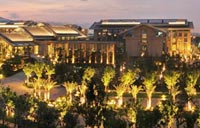Kempinski sends out signals with feast in Shanghai
| Starting younger, aiming higher |
| IHG launches SW China urban resort |
Spicy organic cauliflower was picked to represent Chongqing, known for its spicy hot pot, while braised matsutake and snail broth from Sanya, capital of subtropical Hainan, proved one of the highlights.
The hotel chain decided three years ago to make F&B the focal point for its operating strategy beginning this year to stay competitive in the luxury hotel segment.
"We're trying to get back to our roots and our European heritage, in a way," says Jaako Eskola, the chain's corporate food and beverage manager.
"The hotel was actually started 116 years ago by two restaurateur brothers, and now we're refocusing our energies on F&B in a big way. Instead of just relying on a few star chefs, we have decided to focus on building our own talent in-house and giving them free reign to experiment with a wider range of dishes for the China market.
"We want people to come to our hotels as much for the food as for the rooms, and we aim to turn our restaurants into known brands."
Kempinski Hotels, Europe's oldest luxury hotel group, has 74 five-star hotels in 30 countries. Its Yanqi Lake property in Beijing, which incorporates a 111-room state guest house, a marina and an 18-hole golf course.
















